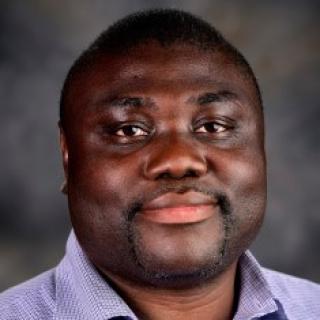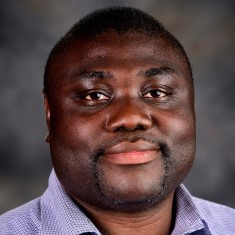
Benedict Anchang, Ph.D.
- Center for Cancer Research
- National Cancer Institute
- Building 101, Room A322
- Research Triangle Park, NC 27709
- 984-287-3350
- benedict.anchang@nih.gov
RESEARCH SUMMARY
Benedict Anchang’s research interests include modelling, integrating and optimizing spontaneous or induced effects associated with complex adverse biological processes, such as cancer or toxicity. These studies are done in human and non-human systems at a multi- and nested-scale level using single-cell analysis, with personalized medicine as a desired goal.
Dr. Anchang is a Stadtman Investigator in the Biostatistics and Computational Biology Branch at the National Institute of Environmental Health Sciences (NIEHS) in Research Triangle Park, NC. He also holds a joint appointment with the Cancer Data Science Laboratory.
Areas of Expertise

Benedict Anchang, Ph.D.
Research
Single-cell technologies are being used to generate a massive amount of data to characterize the biological phenotypic complexity of the normal and diseased microenvironment. Dr. Anchang’s recent work has helped improve our understanding of the role of intratumor heterogeneity in relation to drug resistance, with the goal of optimizing combination therapy based on single cell drug response data for individual patients. He was able to address this computational challenge by developing a drug nested effects model (DRUG-NEM) on single-cell CyTOF drug perturbation data to examine drug combination effects that account for intratumor heterogeneity. Dr. Anchang is currently interested in developing innovative, robust and scalable methods for modelling and visualizing temporal and spatial high-dimensional single-cell data in order to differentiate between spontaneous and chemically-induced heterogeneous neoplastic and non-neoplastic lesions. Dr. Anchang’s research will improve our understanding of tumor progression, toxicity and drug resistance.
Publications
- Bibliography Link
- View Dr. Anchang's PubMed Summary
Epithelial-mesenchymal Transition States and Trajectories with Single-cell Resolution
DRUG-NEM: Optimizing drug combinations using single-cell perturbation response to account for intratumoral heterogeneity
Community assessment to advance computational prediction of cancer drug combinations in a pharmacogenomic screen
Visualization and cellular hierarchy inference of single-cell data using SPADE
Modeling the temporal interplay of molecular signaling and gene expression by using dynamic nested effects models
Biography

Benedict Anchang, Ph.D.
Dr. Anchang was born and raised in Cameroon, where he completed his undergraduate studies at the University of Buea. Dr. Anchang is a Statistician by training with a B.Sc. degree in Mathematics and an M.Sc. degree in Biostatistics from Hasselt University in Belgium. He received his Ph.D. degree in Bioinformatics at the University of Regensburg in Germany. He then moved to Stanford University as a postdoctoral scholar in Computational Biology and worked on developing innovative methods to study biological processes at the single cell level. Dr. Anchang is a Stadtman Investigator in the Biostatistics and Computational Biology Branch at the National Institute of Environmental Health Sciences. He also holds a joint/adjunct appointment with the Cancer Data Science Laboratory.